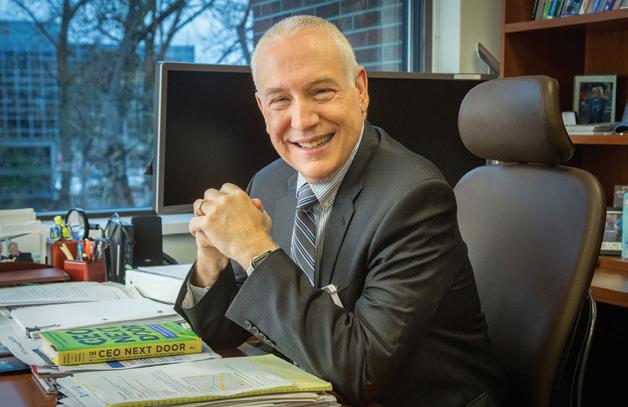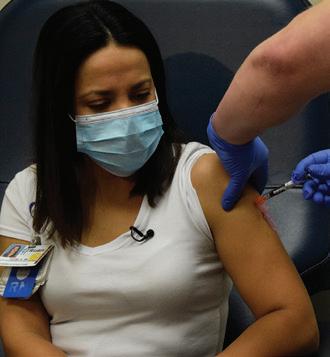
4 minute read
Immunity Countdown
11 important facts about the new COVID vaccine
BY DAVID C. PATE, M.D., J.D.
Dr. David Pate is the former CEO of St. Luke's Health System. He currently sits on Idaho's Coronavirus Task Force.
Photos courtesy of St. Luke's Health System.
1 Should I get the vaccine?
For most people, the answer is yes. For this first vaccine, you will have to be at least 16 years of age. Those who have had severe allergic reactions (e.g., anaphylaxis) to any components of this vaccine in the past will not be eligible to receive the vaccine. We don’t yet have enough data to know whether the vaccine is safe for pregnant or lactating mothers.
2 Where will I go to get vaccinated?
Your primary care provider, local hospital and local pharmacy may be offering the vaccine. Information as to vaccination sites will be made available before the time you become eligible.
3 When will we be able to vaccinate young children?
We don’t know yet, though I would anticipate that we may be able to do so sometime between the end of this school year and before the start of the next.
4 How many shots do I have to get?
Two shots separated 21 days apart.

5 How long until I have to get the next set of shots?
We don’t know yet, but we are anticipating that it may be as soon as a year or as long as three years. We will know better before you will be due for next year’s shots if it is a year.
6 Is the vaccine safe?
Yes, no serious safety concerns have been identified in the clinical trials thus far. With that said, side effects with vaccines are common, and often are evidence of the body mounting the desired strong immune response we are seeking. The most commonly reported side effects were pain at the injection site, fatigue, headache, muscle aches, chills, joint pain and fever. These side effects are generally short-lived and typically resolve within several days of receiving the vaccine. These side effects tend to be very mild with the first shot and more severe with the second. Interestingly, older recipients of the vaccine tended to have milder symptoms with both shots.
7 How effective is the vaccine?
The vaccine is highly effective appearing to prevent COVID in 95 % of those vaccinated. In those few who still got infected despite getting the vaccine, they appeared to have significant protection against 10Can I catch COVID from the vaccine? No. people who are vaccinated and are exposed to the SARS-CoV-2 virus might be able to transmit that virus to others even though they themselves are protected from infection so these infection control measures remain important for now. getting severe disease that would result in hospitalization or death.
8 When can I get the vaccine?
Because of demand and the fact that the vaccine is being manufactured and distributed, each state will get their vaccine in allotments every month, with the first shipments arriving in mid-December. People will be divided up into priority groups that will determine when you will be eligible for vaccination. The first priority group is health care workers and residents of long-term care facilities. They should receive the vaccine starting this month. We don’t know the schedule for when additional groups will be eligible to receive the vaccine, but we would expect that high risk individuals may be able to be vaccinated as soon as February and the general population perhaps as early as April. However, watch your local news for public service announcements as to when it is time for you to be vaccinated.
The Effectiveness
9 Is there a cost for the vaccine?
The vaccine is free, though there may be an administration fee charged by the provider. Be sure to check ahead of your appointment for vaccination whether you will need to pay anything at your visit or whether they will bill your insurance.
10 Can I catch COVID from the vaccine?
No.
11 Once I get the vaccine, do I still have to wear a mask?
Yes, we will all have to continue following all of the public healthadvice about staying home when we are sick, washing or sanitizing our hands frequently, covering our coughs and sneezes, keeping a distance of at least six feet from others with whom we do not live, and wearing masks anytime we are outdoors and cannot maintain the six feet of separation from others or indoors anytime we are with individuals who are not part of our household regardless of distance until a sufficient number of Idahoans and Americans have been vaccinated for us to achieve herd immunity (likely next fall). It is not yet known whether people who are vaccinated and are exposed to the SARS-CoV-2 virus might be able to transmit that virus to others even though they themselves are protected from infection so these infection control measures remain important for now.










